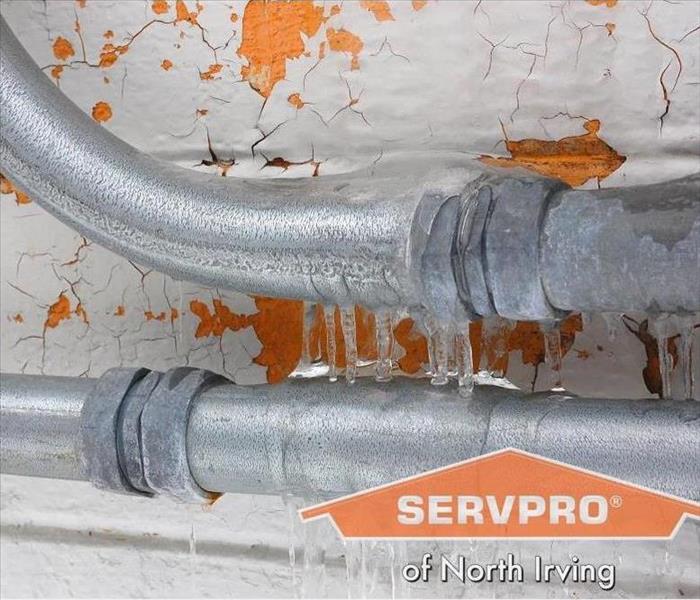How to Prevent Frozen Pipes
2/10/2022 (Permalink)
 Although ice buildup in pipes is common in colder climates like the North, homeowners in Dallas need to take steps to prevent frozen pipes
Although ice buildup in pipes is common in colder climates like the North, homeowners in Dallas need to take steps to prevent frozen pipes
Preventing pipes from freezing in winter is vital to reduce the risk of flood and water damage. Water expands as it freezes, which can cause frozen pipes to crack and burst. Then when the ice melts, water pressure forces water out the broken pipe. The resulting extensive damage to your property can cost thousands of dollars in repairs.
Although ice buildup in pipes is common in colder climates like the Midwest and Northeast, homeowners in Dallas need to take steps to prevent frozen pipes. According to Texas A&M University, water pipes freeze when temperatures drop below 20°F. Areas of a home where pipes easily freeze include basements, crawl spaces, garages, attics, and outdoor supply lines.
The good news is, it’s relatively straightforward to avoid a burst water pipe when ice blockages thaw. Keep reading to find out how to prevent frozen water pipes.
5 Ways to Prevent Frozen Pipes
Here are five easy and cheap ways to prevent water lines from freezing during extremely cold temperatures.
1. Insulate pipe to prevent them from freezing
The first step is to insulate all pipes in uninsulated or unheated spaces like garages, basements, and attics. Adequate pipe insulation keeps heat inside lines instead of escaping into the air. In addition, insulating pipes to prevent them from freezing is relatively cheap compared to costly water damage restoration.
You can create a pipe sleeve using newspaper and duct tape for emergency insulation during unexpected cold weather. Around 1/4 inch of newspaper around cold water pipes should be sufficient.
2. Prevent frozen pipes by draining water from outdoor lines
It is vital to shut off water to all outdoor supply lines and drain pipes before the winter months arrive. Additionally, ensure that all pool and water sprinkler lines are free from moisture in the fall. It is also necessary to drain garden hoses and shut off all outdoor faucets.
3. Allow water faucets to drip
Running a trickle of water is an effective way to prevent frozen pipes. It’s not necessary to let water drip from all faucets, only those served by exposed or uninsulated pipes.
4. Keep your home warm to avoid burst pipes
An easy way to prevent frozen pipes is to keep the heat on. Ideally, room temperatures should be around 70°F. It would be best to keep interior doors open to ensure a consistent temperature throughout your home.
However, it’s also a good idea to keep bathroom and kitchen cabinet doors open to allow warm air to circulate around the plumbing.
If you plan on being away from home during winter, set the thermostat to a constant 55°F.
5. Seal cracks to prevent cold drafts
It is also vital to seal any cracks or openings on your home’s exterior or around windows and doors to prevent air leaks. Not only will you cut down on energy bills, but you will also help prevent pipes from freezing during a cold snap.
Plumbing Mishaps Got You Frozen with Worry? Call Us Today for Help ASAP
What can you do if frozen pipes have burst and you have water damage in your home? Contact SERVPRO at (972) 986-7677 for Dallas Water Damage Restoration. Acting fast is vital to reduce the risk of mold and permanent structural damage to your building’s foundations.






 24/7 Emergency Service
24/7 Emergency Service